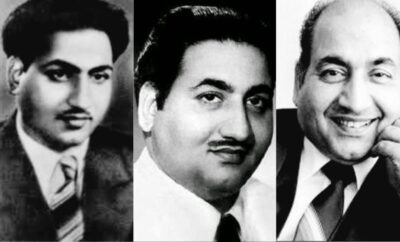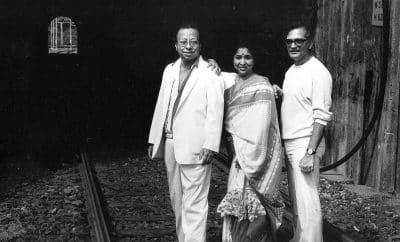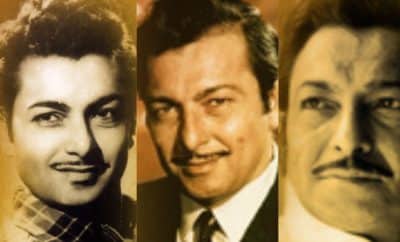Song Sketch
Imperfect World – Kabhi Kisi Ko Muqammal Jahan – Ahista Ahista
We all agree with the fact that everything happens for a reason. Yet when somethings in life go against us, we become resentful. You cannot avoid ways of the world and hence are sometimes forced to do things against your wishes. Face dilemma and pain and in turn become an escapist. Dreams, wishes, expectations remain unfulfilled. It disrupts us emotionally. Our thoughts become fragmented. These feelings slowly change into bitter nightmares, submerging us in those sore torrents. Sometimes you can afford anything but you can’t afford everything. There comes a certain point in life where you understand that there’s no point in chasing certain things. For they are not supposed to be for you. Running after it is only going to tire you and drain you out. We cannot get everything we wish for.
Nida Fazli puts it in a beautiful way –
Kabhi kisi ko muqammal jahan nahi milta
Kahin zameen toh kahin aasman nahi milta
Tamaam shaher mein aisa na ho ki khulus na ho
Jahan umeed ho iski wahan nahi milta
Kahan charagh jalaein kahan gulab rakein
Chhatein toh milti hai lekin makan nahi milta
Ye kya azaab hai sab apne aap mein gum hain
Zaban mili hai magar hum-zaban nahi milta
Charagh jalte hain binai bujhne lagti hai
Khud apne hi ghar mein ghar ka nishan nahi milta
Nobody gets a perfect world. You have to win some, you have to lose some.
A beautiful ghazal by Nida Fazli, composed by Khayyam, later adapted and modified for the movie Ahista Ahista (1981) with female and male version (Asha Bhonsle and Bhupinder Singh respectively). A soulful ghazal from the 80s, when disco was at its peak. It must have been a welcome surprise for some keen-on listening music lovers. Ahista Ahista is loosely based on a Kannada novel Gejje Pooje by M. K. Indira which depicts the story of despicable social tradition of devdasis prevalent in South India. Subbalaxmi (Shashikala) is the head of this house which practices the devdasi tradition and Sangeeta (Nanda) is her favourite trainee. Sangeeta gives birth to a girl (Girish Karnad’s daughter) and names her Chanda (Padmini Kolhapure). Subbalxmi is only thrilled to welcome a girl child into the house so as to take the tradition of devdasis further. But Sangeeta wants her daughter to study and secure a future by doing some job. But Subbalaxmi has her intentions very clear. Knowing the truth, Sangeeta is shattered by the fact that her daughter has to continue with the tradition in the future. It is then that she realises this fact that some wishes remain unfulfilled and sacrifices are unavoidable.
The sitar tugs your heart strings and reflect Nanda’s feelings. Asha Bhonsle’s doleful but sweet voice submits to those emotions.
Kabhi kisi ko muqammal jahan nahin milta
Kahin zameen toh kahin aasman nahin milta
No one gets a perfect world. There will always be something missing from what you get. One can’t have the sky and the earth at the same time. You can’t hold on to everything you have always. You get some, you lose some.
The melancholy sitar fills up the interlude along with dull tabla beats and while the trebles from the violins give way to more tears.
Tere jahan mein aisa nahi ki pyar na ho
Jahan umeed ho iski wahan nahi milta
It is not as if there is no love in this world but one does not get it from where one hopes to get it.
While the female version has just one stanza, the male version by Bhupinder Singh has three with one stanza common in both the versions. Both the versions are soulful and melancholy yet are soothing to the ears. The renditions do not leave you morose even if the music is monotonous throughout in both the versions.
Jise bhi dekhiye wo apne aap mein gum hai
Zubaan mili hai magar num-zubaan nahi milta
The people around are so lost in themselves, you can converse but you can’t call anyone as your confidante. You cannot trust anyone around you. It is a selfish society.
Bujha saka hai bhala kaun waqt ke sholey
Ye aisi aag hai jisme dhuan nahi milta
You cannot douse the flames of time, it is the fire without any smoke. Everyone has to pass through this fire test of time and it comes without any after effects. You won’t be there to witness its after effects.
Nida Fazli’s use of radeef (same words) – nahin milta and the qafiya (rhyming words) – jahan, wahan, aasman, dhuaan, hum-zubaan makes the ghazal more lyrical and gives it a uplifting lilt. Khayyam’s music pacifies the heart in this heart wrenching ghazal. Nanda on the other hand brings so much of calmness to this ghazal appearance wise. There is a kind of tranquility in her aura. She is poised and serene even if she’s disturbed. Shows the amount of compromises she has made in life and surrendered. For she knows there’s no use fighting for those unfulfilled desires and wishes. That is the modus vivendi in this imperfect world.




Vijay Kumar Jai
January 8, 2019 at 3:45 pm
Excellent write-up. But you forgot to mention Shammi Kapoor’s reaction to the heart-tugging sitar notes at the start of the song. The way he gets overwhelmed, his eyes light up and he clasps his hands over his heart is unforgettable.
Deepa
January 13, 2019 at 10:32 am
Thank you. Agree about your observation 🙂
Kanishk koushik
October 12, 2019 at 12:14 pm
Till now I only use to listen this gazal. First time I get to know so much about this gazal. You have written very beautifully.God bless you.
Deepa
October 13, 2019 at 10:37 am
Thank you ? hope you enjoy our other posts too.